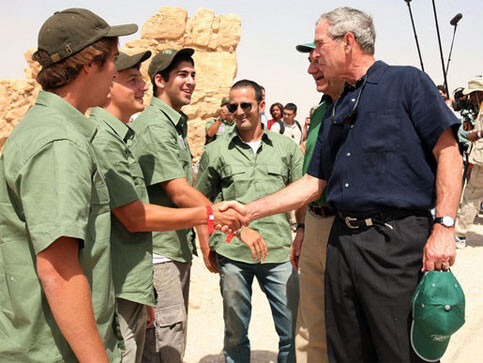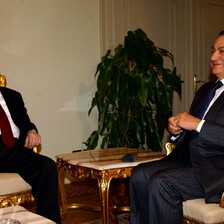The Electronic Intifada 23 May 2008

“Bush spoke as if Israel were part of the US”: US President George W. Bush shakes hands with American students volunteering at Masada National Park in Masada, Israel while he toured the historic site with Prime Minister Ehud Olmert, Laura Bush and Aliza Olmert. (Joyce N. Boghosian/White House photo)
CAIRO, 23 May (IPS) - On his trip to the region this week, US President George W. Bush dismayed even his staunchest Arab allies by expressing unprecedented levels of US support for Israel. In a rare sign of Egyptian displeasure with Washington, Egyptian President Hosni Mubarak left a major economic summit before Bush had a chance to deliver a scheduled address.
“The incident revealed serious tensions between Cairo and Washington,” Emad Gad, expert on Israeli affairs at the semi-official al-Ahram Centre for Political and Strategic Studies, told IPS.
Bush’s tour, which ran from 13-18 May, brought him to Israel, Saudi Arabia and Egypt. The visit follows an earlier trip to the region in January, when Bush met regional leaders with the stated aim of kick-starting Israeli-Palestinian peace talks.
According to Bush aides quoted in the press, the trip was scheduled to allow the US President to attend celebrations in Israel commemorating the 60th anniversary of the country’s establishment and to “reaffirm his personal commitment to peace between Israelis and Palestinians.”
In a speech before the Knesset (Israeli parliament) on 15 May, Israel’s official anniversary, Bush went further than any previous US president in expressing both praise and support for the Hebrew state.
Referring to the Israelis as a “chosen people,” Bush promised unwavering US backing against Israel’s enemies, such as resistance factions Hamas, Hizballah and Iran. In statements heavy on “Judeo-Christian” religious references, Bush went on to describe Washington’s alliance with Israel as “unbreakable.”
Amid standing ovations, Bush told the audience: “America will always stand with you.”
The US President made only fleeting references to Palestinian aspirations for statehood, saying merely that Palestinians could eventually look forward to “the homeland they have long dreamed of.”
Many Egyptian listeners listened to all this with dismay.
“Bush spoke as if Israel were part of the US,” Gamal Zahran, independent MP and political science professor at Suez Canal University told IPS. “His statements revealed long-held beliefs that past US administrations have tried to hide: that American support for Israel is absolute, and that the Arab side is of virtually no value.”
Officials from Palestinian resistance faction Hamas said Bush’s statements were more apropos of “a Zionist rabbi” than of a US president.
After a brief visit to Saudi Arabia on 16 May, Bush then came to the Egyptian Red Sea resort city of Sharm al-Sheikh to attend an annual World Economic Forum meeting. Dubbed “Davos Middle East,” the conference brought together some 14 heads of state along with hundreds of political and business leaders from around the world.
Over the course of the three-day convention, Bush met with a number of regional actors, including Iraqi officials and Palestinian Authority leaders.
But on 18 May — the last day of the event, when both Mubarak and Bush were scheduled to make keynote speeches — the Egyptian president appeared to deliver a rare snub to his US counterpart.
With Bush running more than an hour late, Mubarak decided to begin his address anyway — in the absence of the US presidential delegation.
In his speech, Mubarak blamed the lack of an Israeli-Palestinian peace settlement on the US administration’s blatantly pro-Israel orientations, as evidenced by Bush’s recent statements in the Knesset. Mubarak also rejected US calls for the “democratization” of the Middle East.
Most contentiously, after concluding his address, Mubarak departed the meeting hall without waiting for his US counterpart — who had still not arrived.
When Bush finally spoke more than an hour later, he irked many Arab attendees by praising Israel in similar terms to those he had used days earlier. He further aggravated his Arab hosts by strongly censuring the human rights record in the Arab world.
“America is deeply concerned about the plight of political prisoners in this region, as well as democratic activists who are intimidated or repressed,” Bush told the audience.
According to Gad, the two presidential speeches laid bare the fundamental fault-lines lying across US-Egypt relations.
“While Bush called for democracy and human rights in the region, Mubarak said Egypt wouldn’t accept the imposition of foreign democratic models,” said Gad. “And while Bush claimed terrorism was the main reason for the lack of Arab democracy, Mubarak blamed terrorism on the lack of a viable Israeli-Palestinian peace agreement.”
Egyptian critics were particularly galled by the fact that Bush — even when speaking of long-time “strategic ally” Egypt — made little attempt to tone down his pro-Israel bias.
“He repeated his arrogant, racist mantras without regard to Egyptian or Arab sensibilities,” said Zahran. “He didn’t even mention the Palestinian resistance, which stands alone in the fight against the Zionist-American project for the region.”
According to Zahran, Bush’s emphasis on human rights was little more than a means of keeping Washington’s “moderate” Arab allies — namely Egypt, Jordan and the Gulf States — in line.
“Bush’s statements about democracy and human rights are aimed at pressuring weak Arab regimes into compliance with Zionist-American policies,” he said.
Ayman Abdelaziz Salaama, international law professor at Cairo University, was no less shocked by the extent of the US president’s stated support for Israel.
“In his speeches both in Israel and Egypt, Bush completely negated all the promises made to the Palestinians by previous US administrations,” Salaama told IPS. “He totally ignored Israel’s occupation of Palestinian territory, which represents the longest-running military occupation in modern history.
“His statements represent proof that the US is not a fair mediator in the conflict,” he added.
Salaama went on to say that Bush — despite being in the last year of his second term — remains too beholden to domestic US politics to produce any significant foreign policy breakthroughs.
“He’s too absorbed in the US presidential elections to take chances on foreign policy,” he said. “Bush is only interested in securing the support of America’s all-powerful Zionist lobby for his floundering Republican Party.”
All rights reserved, IPS - Inter Press Service (2008). Total or partial publication, retransmission or sale forbidden.


